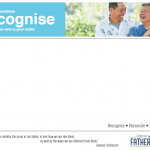| Home | My Story | Opportunities for Connection | Research and Articles |
Father Hunger
 There is a father hunger in all of us. We are not necessarily looking for a perfect father; we just want to have father and to be one for our children.
There is a father hunger in all of us. We are not necessarily looking for a perfect father; we just want to have father and to be one for our children.
According to the psychologist Samuel Orsherson, “many sons’ relationships with their fathers shape in subtle ways how they respond to their wives and children. At home some men become determined to avoid the passivity or dependency they saw in their fathers. Others feel unable as husbands or fathers themselves to live up to the heroic standards their fathers seem to set. Many of us strive to be different from our fathers while also unconsciously trying to live up to their image.”
When you were younger, have you ever vowed that you will not be like your father when you grow up? How did that turn out? Chances are you, like most others who have done the same, find yourself resembling him even more in your adulthood. Is it genetic? No. It is the wounded father image in you that acts like a rudder that is stuck in one position. It can be loosened by recognising, reconciling, and reconnecting with our fathers. You cannot just wish it away.
3R’s
Recognise
Know the man who is your father.
“Every man needs to identify the good in his father, to feel how we are like them, as well as the ways we are different from them.” Samuel Orsherson
 I can bet that you, like all men, think of your father as just that – your father. But he is more than just your father. He is a man who happens to be your Father. He was (maybe still is) a son, was a child, a teenager who grew into a young man, fell in love, got married and had YOU. How much of that story do you know?
I can bet that you, like all men, think of your father as just that – your father. But he is more than just your father. He is a man who happens to be your Father. He was (maybe still is) a son, was a child, a teenager who grew into a young man, fell in love, got married and had YOU. How much of that story do you know?
Recognising your father is getting to know the man who is your father. In doing so, you are also getting to know yourself.
Self-understanding is an essential first step for men today. If a man is to be a good father, to his son, or a good husband to his wife, he needs to know what he got, or wanted and didn’t get, from his own father, how he was both strengthened and wounded by that relationship; how it has influenced his own fathering style and his own identity as a man.
Until a man “names his father,” sees him clearly, and accepts him for who he is and was, it is much more difficult for him to grow up and become a father to his children, a husband to his wife, or a mentor to the younger generation at work. That is every man’s task of healing the wounded father within. The ongoing relationship between a new father and his own father is particularly important.
Read My Story about how I started to recognise my father.

Reconcile
 As you listen to the stories about your father, you will begin to understand what made him the man that he was, why he acted the way he did, and fathered you the way he did. It is not an excuse for what he did or did not do, but it will at least explain why. This will help you to develop empathy towards him and enable you to forgive him. Forgiveness is not dependent on your father’s repentance or response. Forgiveness resolutely faces the facts (with all the pain) and then consciously decides not to hold those actions against him.
As you listen to the stories about your father, you will begin to understand what made him the man that he was, why he acted the way he did, and fathered you the way he did. It is not an excuse for what he did or did not do, but it will at least explain why. This will help you to develop empathy towards him and enable you to forgive him. Forgiveness is not dependent on your father’s repentance or response. Forgiveness resolutely faces the facts (with all the pain) and then consciously decides not to hold those actions against him.
Read “Fathers and Sons”
In Making Peace with Your Father, David Stoop writes, “Forgiveness is something we do on our own initiative with or without his cooperation.” He adds, “If our aim is truly to make peace with our fathers and to move on in a life of joyful wholeness, we have no choice but to forgive him.”
Read My Story about how I reconciled with my father.
Here are 7 Suggestions for a son who wants to reach out to his father.
Reconnect
Having recognised and reconciled with your father, you must not stop here. The ongoing relationship between a new father and his own father is particularly important. START NOW to reconnect and relate with each other as father and son, as it should have been.
A Dislocated Shoulder
A few years ago, I woke up one day with limited mobility in my left arm. It hurt like hell when I tried to lift it above my waist. I thought that it was just a stiff shoulder. “It will pass,” all my friends and colleagues told me.
As days turned into weeks, and weeks turned into months (six, to be exact), the pain did not go away nor did my mobility improve. So I decided to get it checked out by a chiropractor.
After a brief examination, he told me that I had indeed dislocated my shoulder.
“Can’t you just pop it back in?” I asked.
“I could if it happened a few minutes ago. But after six months the joint is covered by a lot of scared tissue. It will take a series of ultra-sound therapy to remove it,” he replied.
To be honest, the therapy was more painful than the actual injury. But in the end my shoulder was healed.
Why did I share this story with you? To let you know that a relationship that has been in distress or dislocated for an extended period of time (like my shoulder) cannot be expected to be made whole again immediately. It will require some ‘therapy’ to remove the scared tissue.
I am willing to help you along this part of the journey if you feel you are not sure how to go about doing this. Please feel free to contact me.
Restoration
Restoring the family. Restoring the nation.
Our desire is for RESTORATION.
First and foremost, we long to see the intergenerational familial links restored through the clearing up of all misunderstandings, forgiving all offences, and healing all wounds.
With that, we will be able to start the restoration of the identity and the individual psychological well being of grandfathers. No longer will our elders feel isolated, depressed, and suicidal.
Finally, when intergenerational bonding is strong, there will be a free transmission of values from one generation to the next. Though we might not agree with the methods employed by each generation, there is much wisdom to be gained from our elders.
